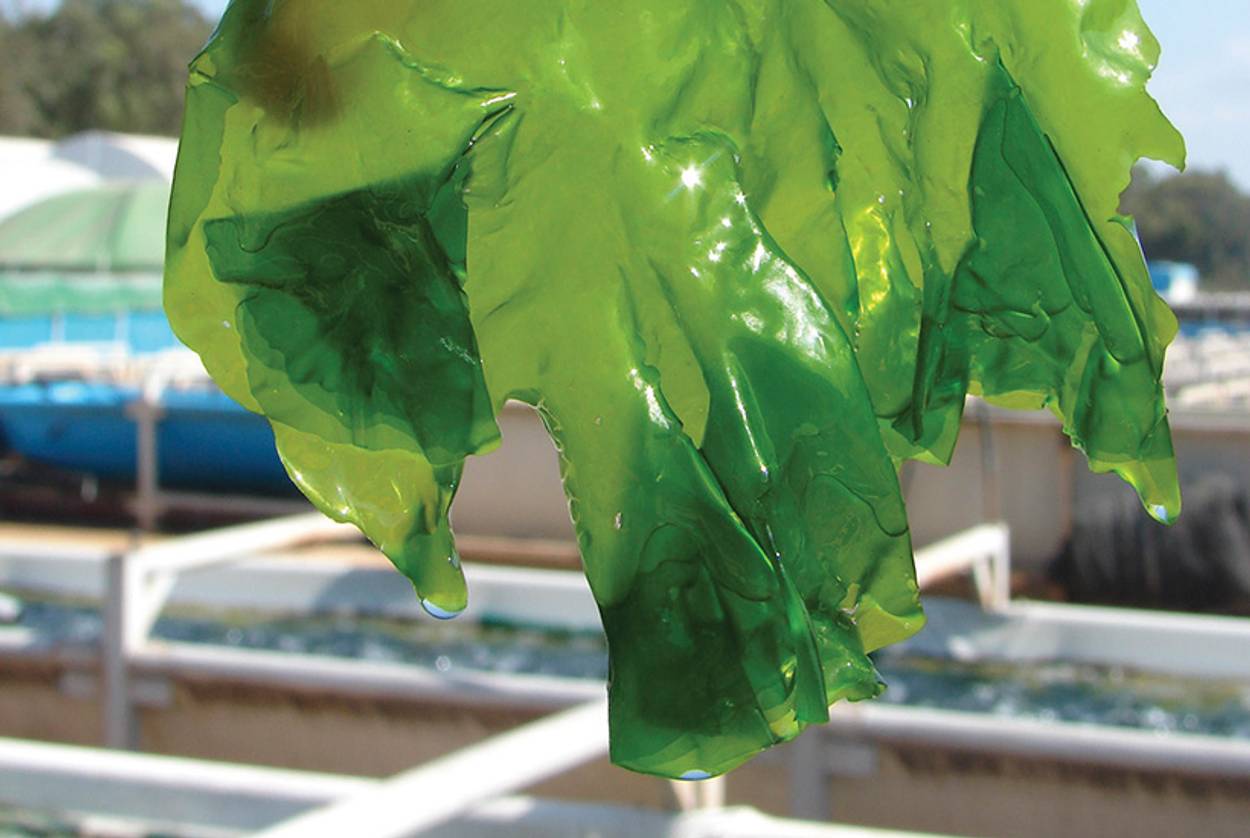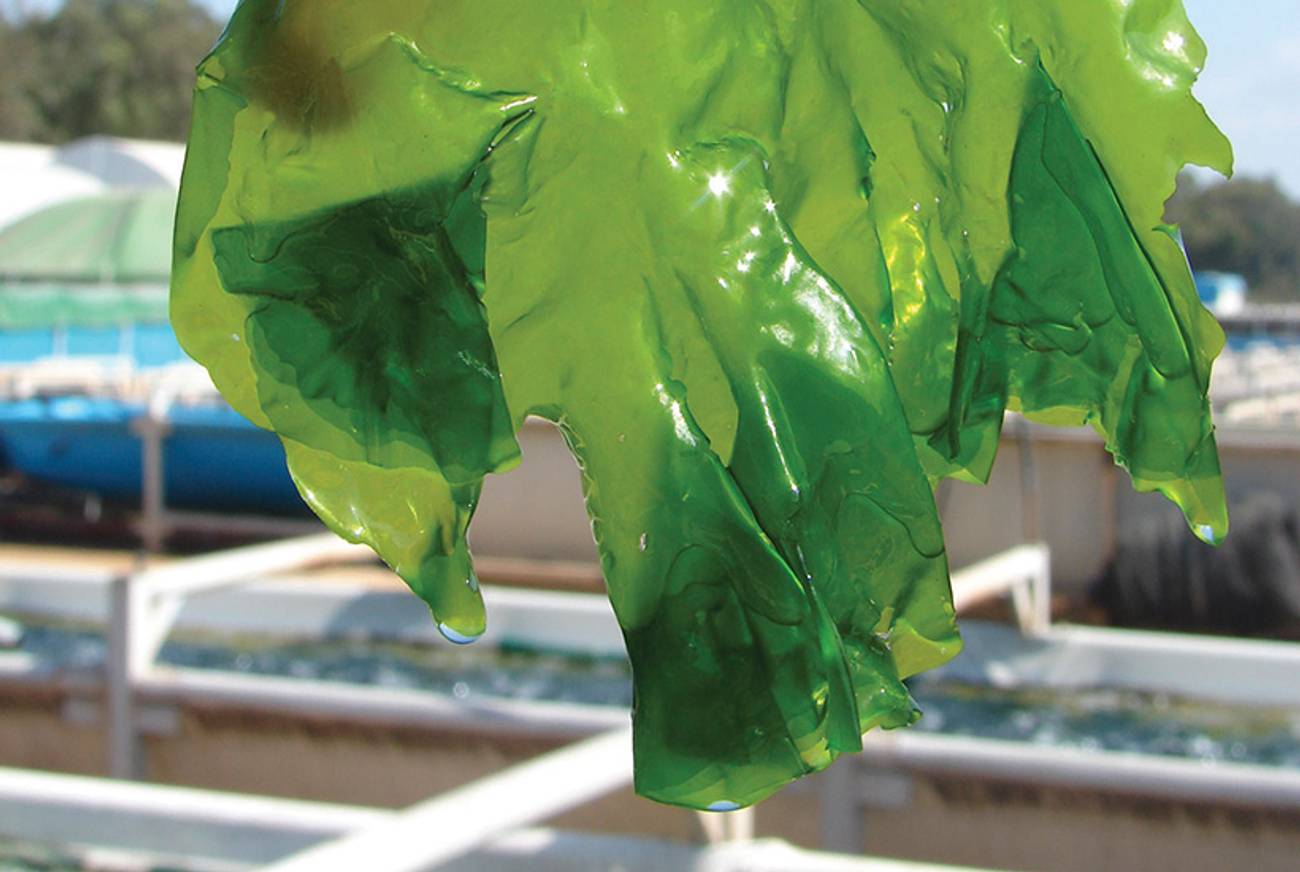An Israeli Company Bets That Seaweed Isn’t Just for Sushi Anymore
It’s fresh, it’s nutritious, and it’s locally grown. But will anyone actually eat it instead of lettuce or spinach?




Israel’s next big business might be seaweed.
Moshe Rivosh is the CEO of a company called Seakura, which wants to change the way Israelis eat. A member of Kibbutz Lohamei HaGeta’ot, Rivosh was one of the founders nearly 30 years ago of Tivall, which today claims to be the world leader in developing, manufacturing, and marketing ready-made vegetarian food products. Now Rivosh wants Israelis, vegetarian or not, to add seaweed to their diet—and not just wrapped around sushi rolls. He wants them to start cooking with it, using it in salads, and consuming it on a regular basis, like spinach or lettuce.
Seakura is one of the few companies in the world that markets fresh, rather than dried, seaweed. And while most seaweed is collected from the sea, Seakura—which has its headquarters in Herzliya Pituach—farms its product in controlled pools at Michmoret, a coastal moshav in central Israel off the Mediterranean.
Previously marketed only in the U.K., Belgium, and the Netherlands, Seakura’s products are now entering the Israeli market. Its seaweed salads debuted last December on the shelves of Eden Teva, Israel’s leading supermarket chain specializing in organic and natural foods, ecological products, and dietary supplements; soon they’ll be on their way to other local retailers as well.
Since Seakura’s seaweed is healthy, organic, and locally grown, Rivosh can see it becoming part of Israeli cuisine. “Israelis have adopted many different products that weren’t part of it originally, for their taste and health benefits,” he said, referring to the likes of quinoa or arugula. “Our products fit the health and vegan trends perfectly, and I don’t see why seaweed shouldn’t be adopted as well.”
***
This isn’t the first time someone has banked on Israelis eating seaweed. Back in 1995, a company launched at Kibbutz Rosh Hanikra in northern Israel. “We grew Gracilaria and marketed it to restaurants and supermarkets,” said Arnon Feldman, the owner of the company, which folded in 2002. “We were the first company in Israel to grow seaweed for commercial purposes. Before that it was grown only for research purposes.” These days Feldman is opening a new company, growing seaweed for cosmetics and toiletries. He believes that growing seaweed for food isn’t profitable enough and doesn’t want to do that again. “The closest I will get to food this time is diet supplements,” he said.
But perhaps the Israeli palate has changed in the past decade, as more Asian-inspired restaurants have opened. “Israelis love sushi and they love nori—the seaweed used for wrapping the sushi—and wakame, whether as wakame salad or in miso soup,” said Aki Tamura, sushi chef at the kosher Japanese restaurant Minato, which has branches in Herzliya and Caesarea.
Seakura was founded in 2005 by the Canadian Silver family—which made its fortune in real estate and now invests in Israeli companies—with an investment of 15 million shekels (more than $4 million). In the beginning Seakura grew seaweed in Rosh Hanikra, where Feldman’s company used to be, before moving to Michmoret. The company is still not profitable, but the Silvers are betting on the commercial potential of feeding the world seaweed. “Most of the Israeli public hasn’t been exposed to seaweed and to our seaweed salads yet,” said Rivosh. “The ones who already tried them liked our products, and there have been repeat purchases.”
Seakura farms two kinds of organic seaweed, both of which are sold fresh or dried: Ulva lactuca, which is also known as sea-lettuce, and Gracilaria, which is a kind of red algae. In Japanese, kura means treasure house or treasure chest, and the founders of Seakura maintain that seaweed is indeed a treasure, a nutritionally dense super-food: Sea-lettuce is high in protein and has all nine essential amino acids. It’s also rich in magnesium, potassium, calcium, fiber, and the essential vitamins A, B, C, and B12. Gracilaria is rich in protein, vitamins, and minerals. When consumed fresh, both can be eaten on their own, or mixed into noodles dishes, fish dishes, salads, soups, rice dishes, casseroles, stews, ethnic foods, pasta, frozen and packaged meals, pizza sauces, toppings, poultry, sauces, dressings, and just about anything. And when used dried, in flake or powder form, they are great as a spice, flavor enhancer, and aromatic ingredient. While the company is beginning to infiltrate the retail market with its fresh seaweed, most of Seakura’s produce is currently sold to food manufacturers who process it and use it as part of their own products. Seakura also markets three kinds of packaged salads on its own.
While Seakura is supplying Israelis with locally grown, fresh seaweed, Dr. Rachel Einav is teaching the public how to cook with it. Einav, a marine biologist from Zikhron Ya’akov who specializes in algae and is also CEO of environmental consulting company Blue Ecosystems, has published three books on seaweed. A cookbook she co-wrote with chef Itzhak Nathan Levy—Seaweeds in Olive Oil: Algae and Sea Vegetables in the Mediterranean Kitchen—includes recipes like Tahini in Nuri Flakes; Taboule With Fresh Seaweed Salad; Zucchini Stuffed With Halloumi Cheese, Wakame, and Vegetables; Foccacia With Nuri Flakes; and Nuri-Coated Shrimps on Rosemary Skewers. “The idea behind the book was adapting the use of seaweed in the kitchen to Israeli tastes and Western culture,” said Einav, who also did a showon Israeli television about cooking with seaweed.
The fact that Seakura’s seaweed grows in pristine conditions is one of its major selling points. Most of the seaweed consumed in Israel is imported from the Far East, where it is collected from the sea. “The sea is a dirty place,” said Rivosh, “and therefore whoever eats seaweed from the sea eats polluted food.”
Dr.Yossi Tal, a marine biologist who is part of the company’s scientific board, echoed Rivosh: “Seaweed gathers pollutants, especially heavy metal. Nuclear waste can cause seaweed to be contaminated. People all over the world eat seaweed gathered from the sea, but that doesn’t mean they’re not at risk.”
Einav believes this to be an overstatement: “There is no problem of pollution in the sea,” she said, “but researchers love to exaggerate and to shout that the end of the world is here.”
“If the seaweed comes from a polluted area of course it can be dirty,” added Tamura, the sushi chef, “but in Japan they know not to use seaweed that grows near the ports of big industrial cities. It’s important to get your seaweed from a clean place.”
Tal described Seakura’s process for farming outside the sea: “The seaweed is grown in a clean, unpolluted environment from which it is harvested, washed, and packaged under strict supervision. Water from the Mediterranean Sea is filtered into special eco-pools on shore where the seaweed grows under a controlled process.”
Rivosh hopes that his company’s technology will spread around the world. But for now he’s focusing on his home market. “There is no history of growing seaweed in Israel,” he said, “but there is a very bright future.”
***
Like this article? Sign up for our Daily Digest to get Tablet Magazine’s new content in your inbox each morning.
Dana Kessler has written for Maariv, Haaretz, Yediot Aharonot, and other Israeli publications. She is based in Tel Aviv.
Dana Kessler has written for Maariv, Haaretz, Yediot Aharonot, and other Israeli publications. She is based in Tel Aviv.